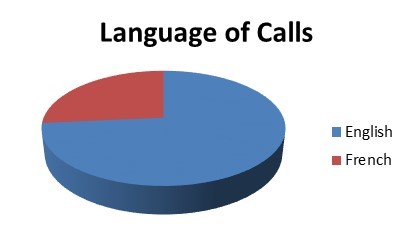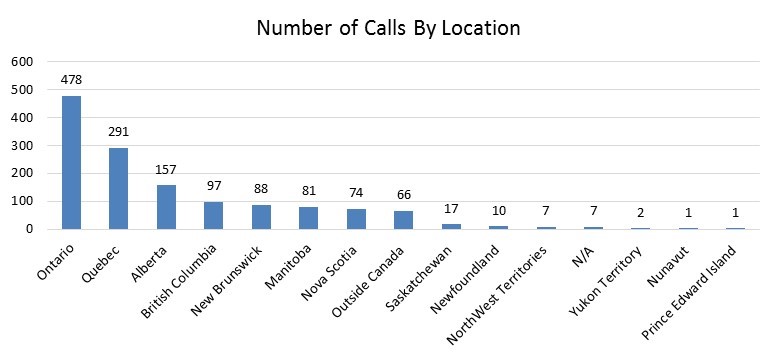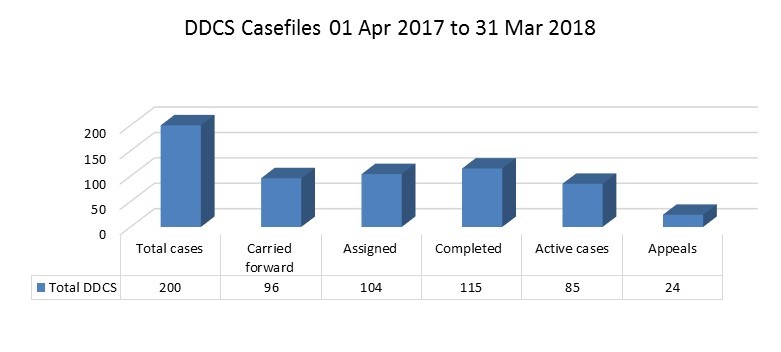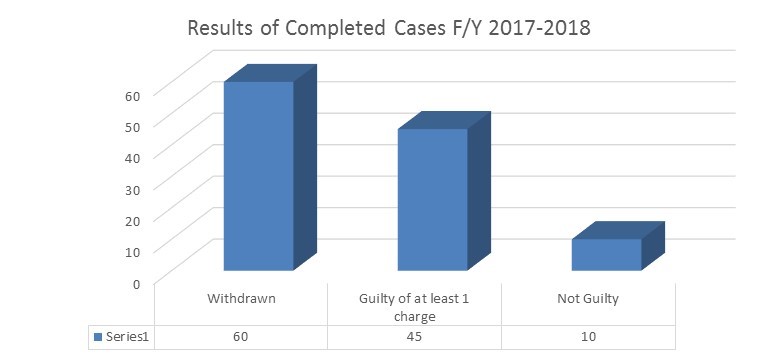Director of Defence Counsel Services Annual Report 2017-2018
| Fund | Expenditure | |
|---|---|---|
| C125 | Contracting (Counsel, Experts, and Services) | $181,573.00 |
| L101 | Operating Expenditures | $119,136.00 |
| L111 | Civilian Pay and Allowances | $179,767.00 |
| L127 | Primary Res Pay, Allowance, Ops, Maintenance | $333,612.00 |
| Total | $814,088.00 | |
15. This amount is less than our projected business plan. This reflects the fact that, commencing in October of this reporting year, we were fully staffed with regular force trial counsel and therefore able to accommodate in a more cost-effective manner the increased activity resulting from the nomination of an additional military judge, the decision of the Supreme Court of Canada in Jordan and the disciplinary cases generated by OP Honour.
16. Within Defence Counsel Services there are three methods of service delivery; regular force counsel, reserve force counsel and, pursuant to subsections 249.21(2) and (3), of the National Defence Act, contracted counsel. Regular force counsel are the most cost effective means of service delivery and do not require the expenditure of budgeted funds. The use of reserve force counsel and contracted lawyers come at a cost. We have tried to restrict the use of contracted counsel to situations of conflict of interest.
Training, Services, and Activities
Professional Development
17. The Federation of Law Societies’ National Criminal Law Program remains the primary source of training in criminal law for counsel with Defence Counsel Services. In July 2017, six regular force counsel and two reserve force counsel attended this program, which was held in Vancouver, British Columbia. Additionally, in February 2018, most regular and reserve force counsel attended an annual one-day in-house training program in Ottawa which dealt with a variety of issues relevant to our mandate. Certain other courses sponsored by the Office of the JAG, the Canadian Bar Association, the Criminal Lawyers’ Association and the Department of Justice were attended by individual counsel in order to meet their specific professional needs.
Duty Counsel Services
18. Legal advice is available twenty-four hours a day, seven days a week, to members who are under investigation or in custody. Legal advice is typically provided through our duty counsel line, a toll-free number which is distributed throughout the Canadian Armed Forces and is available on our website or through the military police and other authorities likely to be involved in investigations and detentions under the Code of Service Discipline.

Language of Calls: Pie chart illustrating 1,013 English calls in blue and 365 French calls in red.
19. During the reporting period, Defence Counsel Services recorded 1,378 calls on the duty counsel line. Services are provided in both official languages. The language of service was divided generally between English for 1,013 calls and French for 365 calls as depicted in the chart below.
20. The calls ranged in duration but, on average, lasted for approximately 15 minutes. Calls originated from every Canadian province and territory, as well as various locations outside of Canada from members serving abroad. The number of calls by location is illustrated in the graph below.

See below for description of graph.
| Location | Number of Calls |
|---|---|
| Ontario | 478 |
| Québec | 291 |
| Alberta | 157 |
| British Columbia | 97 |
| New Brunswick | 88 |
| Manitoba | 81 |
| Nova Scotia | 74 |
| Outside of Canada | 66 |
| Saskatchewan | 17 |
| Newfoundland | 10 |
| Nortdwest Territories | 7 |
| N/A | 7 |
| Yukon Territory | 2 |
| Nunavut | 1 |
| Prince Edward Island | 1 |
Court Martial Services
21. When facing court martial, accused persons have the right to be represented by lawyers from Defence Counsel Services at public expense, they may retain legal counsel at their own expense, or they may choose not to be represented by counsel.
22. During this reporting period Defence Counsel Services provided legal representation to accused persons in 200 files referred for penal prosecution. This number includes 96 cases which were still awaiting disposition at the commencement of the year and were carried over from the previous reporting year. It also includes 104 new cases which defence counsel were assigned during this reporting period. It does not include the twenty-four clients represented by defence counsel on appeal.

See below for description of graph.
| Number of Cases | |
|---|---|
| Total Cases | 200 |
| Carried forward | 96 |
| Assigned | 104 |
| Completed | 115 |
| Active Cases | 85 |
| Appeals | 24 |
23. Of these 200 client files open this year, 115 were completed during the reporting period. Of these, 60 had their charges withdrawn without trial but after assignment of counsel and some level of intervention by defence counsel. This involvement ranged from simple requests for disclosure, to informal discussions with prosecution respecting reasonable prospect of conviction or public interest in proceeding, to more formal motions and withdrawal after convening and assignment of a military judge.
24. Of the remaining 55 cases, our records indicate that in 10 of these cases the accused was found not guilty of all charges and in 45 cases the accused was either found guilty or plead guilty to at least one charge. Of the cases completed during this reporting period, approximately 60% of those who requested representation by Defence Counsel Services were able to move forward without conviction.

See below for description of graph.
| Number of Cases | |
|---|---|
| Witddrawn | 60 |
| Guilty of at least 1 charge | 45 |
| Not Guilty | 10 |
25. Under the National Defence Act, the Director of Defence Counsel Services may hire civilian counsel to assist accused persons at public expense in cases where, having received a request for representation by Defence Counsel Services, no uniformed counsel are in a position to represent the particular individual. This occurs primarily as a result of a real or potential conflict of interest, often involving Defence Counsel Service’s representation of a co-accused. It may occur for other reasons as well. During this reporting period civilian counsel were hired by the director to represent persons in 14 cases. Four contracted cases proceeded to court martial for disposition. In two cases the charges were withdrawn by the prosecution prior to convening. Two cases involved counsel at the investigative stage and were dropped short of charges. The 4 remaining cases are awaiting prosecutorial decision as to whether to proceed.
Appellate Services
26. Twenty-four appeals were touched on at various points during this reporting period. This includes 17 cases which, at some point during this reporting year, were open before the Court Martial Appeal Court. It includes 7 cases which are presently before the Supreme Court of Canada. Before both courts, cases have been grouped together by issue and we are presently before the Supreme Court of Canada on two issues: the scope of the exception the right to trial by jury under section 11(f) of the Charter; and the application, to a charge of sexual assault, of the defence of honest but mistaken belief in consent.
27. Where a member is the appellant and is requesting representation at public expense by Defence Counsel Services, they are required to make an application to the Appeal Committee, established under Queen’s Regulations and Orders, who assess whether the appeal has merit. During this reporting period one member made a request to the Appeal Committee to be represented on his appeal to the Court Martial Appeal Court. This request was approved. Successful requests to the Appeal Committee were also made for representation at public expense on both issues before the Supreme Court of Canada.
Charter challenge under s. 11(f)
28. Leave to appeal to the Supreme Court of Canada has been granted in Stillman et.al. (SCC File no. 37701) on the issue of the scope of the military exception to the right of Canadians to the benefit of trial by jury as guaranteed under section 11(f) of the Canadian Charter of Rights and Freedoms.
29. On 3 June 2016, the Court Martial Appeal Court had rendered its decision in R. v. Royes 2016 CMAC 1 and concluded that subsection 130(1)(a) of the National Defence Act, which allows all federal offences committed in Canada by those subject to the Code of Service Discipline to be tried by court martial, did not violate the right to be tried by jury guaranteed under subsection 11(f) of the Charter. Leave to appeal to the Supreme Court of Canada was denied.
30. At the same time as R. v. Royes was unfolding, twelve cases including Stillman were under reserve by a different panel of the Court Martial Appeal Court on this same constitutional issue. This panel followed the decision in R. v. Royes but expressed a number of concerns within their decision. Leave to appeal to the Supreme Court of Canada has been granted. Stillman, when addressed by the Supreme Court, should define the scope of this exception and clarify the rights of those tried by courts martial.
31. More recently, a third panel of the Court Martial Appeal Court was again seized of this same constitutional issue in the case of Cpl Beaudry (CMAC-588). This decision is pending. The Supreme Court of Canada has now directed that the appellants in Stillman et.al. wait until the CMAC has published the decision in Beaudry before filing the appellants factum in Stillman et.al. This will have the effect of placing all of the outstanding jurisprudence on this issue before the Supreme Court of Canada as they address this issue.
Other appellate cases
32. During this reporting period, four other Court Martial Appeal Court appeals raised substantial questions respecting the administration of military law. These were the cases of Maj Wellwood (CMAC 571), Cpl Golzari (CMAC 587), MCpl Edmunds (CMAC 590) and WO Gagnon (CMAC 577).
33. In R. v. Wellwood, the issue was whether a superior officer obstructed a member of the military police in violation of section 129 of the Criminal Code of Canada. The superior officer was engaged in a military exercise when she was informed that one of her subordinates had been experiencing suicidal thoughts. She immediately took action to have that member located and assisted.
34. At the same time, the military police received a 911 call indicating that there was a member involved in the exercise who had called home while or after experiencing suicidal thoughts. The military police attended at the unit lines and were told that the chain of command was aware of the issue and were addressing it.
35. The attending military police member decided to take over management of the issue and a conflict of authority emerged between the major, who wanted to remain in charge of the welfare of her subordinate, and the military police corporal who viewed the welfare of the member as a police matter over which he had primary responsibility. The corporal perceived the officer as obstructing him in the performance of his duties and laid a criminal charge to that effect.
36. The officer was convicted at trial. The matter was heard at the Court Martial Appeal Court in April 2016. The decision of that court was rendered in June 2017. The Court Martial Appeal Court quashed the conviction and ordered a new trial on the basis that Military Judge’s instructions did not adequately inform the panel of Maj Wellwood’s own obligations towards the welfare of her subordinate. The prosecution decided not to retry.
37. In R. v. Golzari, the main issue was whether an off-duty soldier, who was denied access to the main gate of Canadian Force Base Kingston because he refused to say where he was going, had committed an act to the prejudice of good order and discipline contrary to s. 129 of the National Defence Act.
38. At trial, the accused was acquitted because the prosecution had failed to prove that the member had a positive duty to provide destination details to the gate sentry. On appeal, the prosecution argued that proof of such duty was not required under section 129 of the National Defence Act.
39. The prosecution argued not only that proof of duty was not required under section 129 but further that, in most cases, proof of prejudice to good order and discipline is a matter of judicial notice, to be inferred by the military judge, based on his own knowledge of service life and that, as such, it requires no evidence. In a decision released in June 2017 the Court Martial Appeal Court agreed. This decision appears to be in some tension with relevant Supreme Court of Canada jurisprudence and courts martial appear to be divided on how it should be interpreted and applied.
40. In R. v. Edmunds the appellant was found guilty, at court martial, of four counts of fraud contrary to section 380 of the Criminal Code. He was sentenced to 30 days incarceration and released pending appeal. He appealed, among other reasons, on the basis that the charges and thus the convictions were void given that the charge-layer did not have, at the time that he signed the record of disciplinary proceedings, reasonable grounds to believe the offences had been committed. In a decision, given from the bench, the Court Martial Appeal Court agreed with this position. This case has the effect of reaffirming some long-standing jurisprudence surrounding personal responsibility for the signing of the charging document as found in Nye v. The Queen (1972) C.M.A.R. vol. III p. 85.
41. In R. v. Gagnon the member was found not guilty of sexual assault before a General Court Martial. The Director of Military Prosecutions appealed on the basis that the defence of honest but mistaken belief in consent should not have been left to the panel. A majority of the Court Martial Appeal Court agreed and ordered a new trial. The Chief Judge of the CMAC dissented, ruling that there was an air of reality to the defence and that the defence was properly considered by the panel. WO Gagnon filed his appeal as of right with the Supreme Court of Canada and a tentative date for hearing has been set for October 2018.
Conclusion
42. Again it has been a challenging year for those within Defence Counsel Services. As in past years, the priority has remained the provision of legal advice and legal counsel to qualifying members of the military community who request our assistance. It is a privilege to assist these members. They are often facing a very difficult period within their lives and careers. Many continue with their careers and their contribution as dedicated and reliable members of the military community. For others, their charges are part of their transition from service to civilian life.
D.K. Fullerton
Colonel
Director of Defence Counsel Services
30 May 2018
